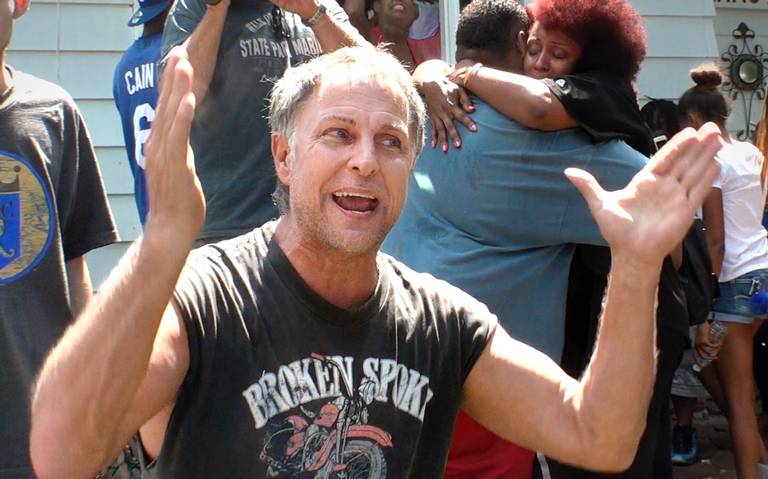
CLAYTON • A 22-year St. Louis County police veteran who was once picked to become the department’s liaison to the gay community is now suing the department for discrimination.
In a lawsuit filed Jan. 10, Sgt. Keith Wildhaber claims a former St. Louis County Police Board member told him to “tone down your gayness” if he ever wanted to be promoted.
Wildhaber declined to comment for this story. His attorney, Russell Riggan, did not respond to multiple requests for comment.
The sergeant ranked third among 26 people who took a promotions test in February 2014, and also was third in a second round of tests in February 2015, according to the lawsuit.
But Wildhaber has watched as virtually all of his peers were promoted, even though his written performance reviews show that he “exceeds standards” or is “superior” in all rated categories, the suit says.
“Defendant believes plaintiff’s behavior, mannerisms, and/or appearance do not fit the stereotypical norms of what a ‘male’ should be,” according to the lawsuit.
Police Chief Jon Belmar would not comment on the suit or agree to an interview about his department’s interaction with gay officers, said a department spokesman, Sgt. Shawn McGuire.
Gay officers can raise concerns through the chain of command, McGuire said.
During a routine business check at Bartolino’s restaurant in 2014, Wildhaber visited with its owner, John Saracino, according to the lawsuit. Saracino was a member of the department’s civilian police board at the time.
“The command staff has a problem with your sexuality. If you ever want to see a white shirt (i.e. get a promotion), you should tone down your gayness,” Saracino allegedly told Wildhaber.
Reached Wednesday, Saracino said: “I never had a conversation like that. I would never say anything like that. That’s not me.”
Saracino later resigned from the board in controversy over a letter of support he asked Belmar to write to a federal judge who was sentencing Saracino’s nephew in a marijuana ring.
On April 1, 2016, Wildhaber filed a charge of discrimination with the U.S. Equal Employment Opportunity Commission and Missouri Commission on Human Rights, alleging that he was unfairly passed up for advancement .
About a month and a half later, the department reassigned him from afternoon shifts at the Affton precinct to midnights in the Jennings precinct, the suit says. It says that the new assignment was about 30 miles from Wildhaber’s home in Oakville, according to the suit.
Several large departments nationally, including St. Louis city, have members appointed as liaisons to gay residents and officers, and diversity recruitment efforts.
A Justice Department report critical of the St. Louis County police response to Ferguson protests in 2014 suggested that the department create a diversity council to advise commanders on recruitment and other issues regarding an array of people — including ethnic, lesbian, gay, bisexual, transgender and linguistic minorities.
The department has not acted on the recommendation, McGuire said.
“No liaison has been assigned, so there is no status update,” McGuire said in a prepared statement. “Our main focus in recruiting is attempting to recruit outstanding candidates who want to become part of our organization, no matter what their status, race, religion, sexual preference, political belief, or aspiration is.”
The St. Louis County Police Association has asked Wildhaber to serve on a committee it is forming to “ensure all of our members are treated equally and fairly in the workplace, which is a bedrock principal of our organization,” said Joe Patterson, its president and a county police detective.
“We have been actively recruiting LGBT members and minority members to serve on steering committees in order to bring forth not only their concerns, but their ideas on how to improve the police association,” Patterson said.
He said the association is eager to work with the police department and community.
“In the course of our duties, we encounter people from all walks of life and all backgrounds, and our police department should be reflective of the population we serve,” he said. “I don’t think you can be overly inclusive in 2017.”
In St. Louis, Police Chief Sam Dotson appointed Capt. Angela Coonce as the department’s LGBT liaison about three years ago. The department also has had a recruitment booth at the PrideFest diversity celebration for about the same amount of time.
“She advocates for policies, and when we were talking about the transgender community, she became the subject matter expert and liaison into the community to help me when issues arise internally,” Dotson said.
About the time Coonce became the city police liaison, county Police Chief Tim Fitch asked Wildhaber to serve in that role in the county. Belmar replaced Fitch as chief in January 2014 and it didn’t happen. Wildhaber took the test to become a lieutenant the next month. He remains a sergeant.
Wildhaber, with the department since 1994, previously served four years in the Army. In 1998, he won a medal of valor from the department for rescuing someone from a burning car.
EDITOR’S NOTE: Sgt. Shawn McGuire said in an earlier version of this story that gay officers could take concerns to the department’s Employee Assistance Program. He said Thursday that he misunderstood the question in an email exchange with a reporter, and that gay officers can use the department’s chain of command.
http://www.stltoday.com/news/local/crime-and-courts/st-louis-county-cop-says-he-was-told-to-tone/article_a5afe909-771f-5726-8db9-5bdffe0ae1c1.html
